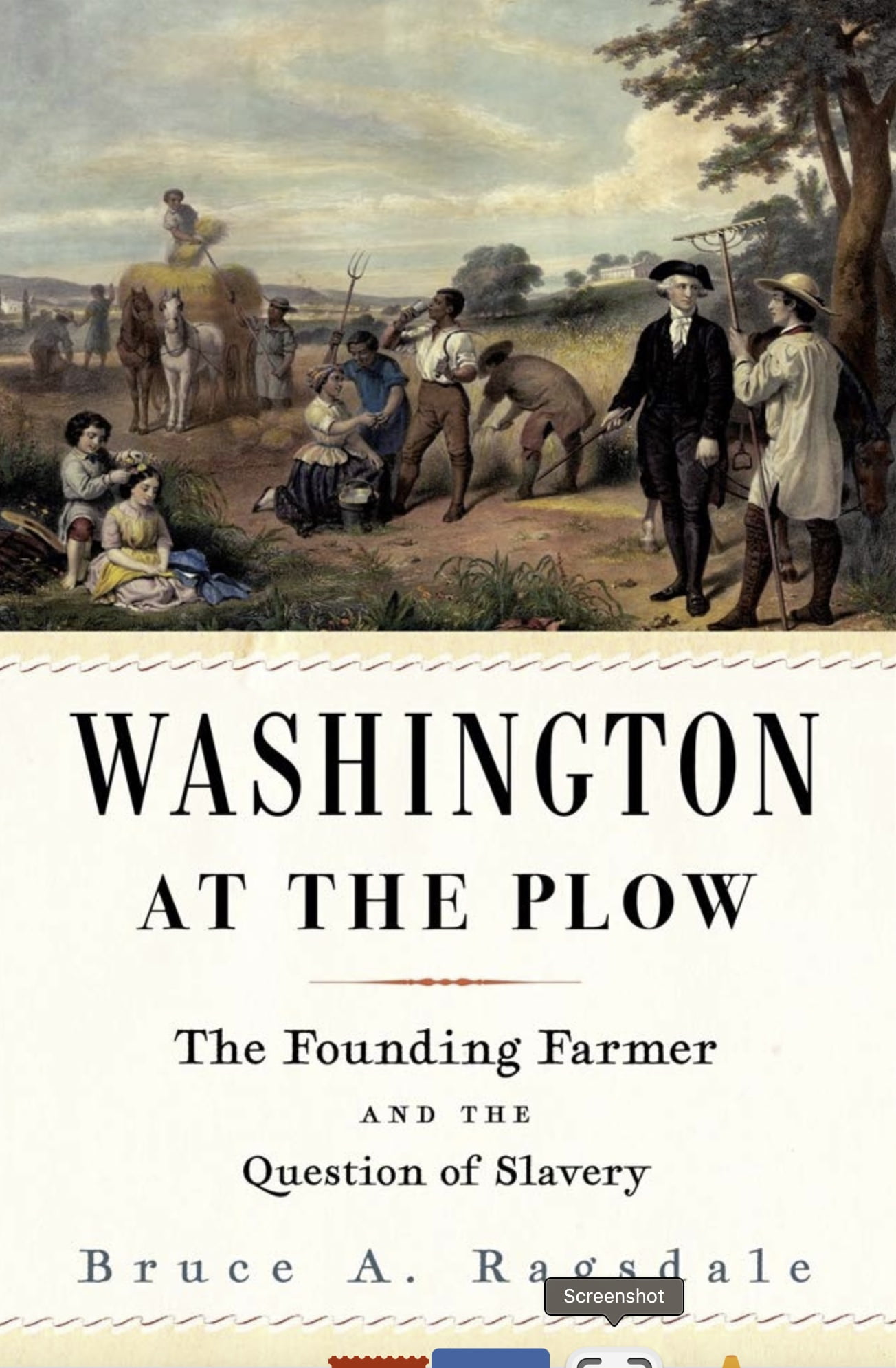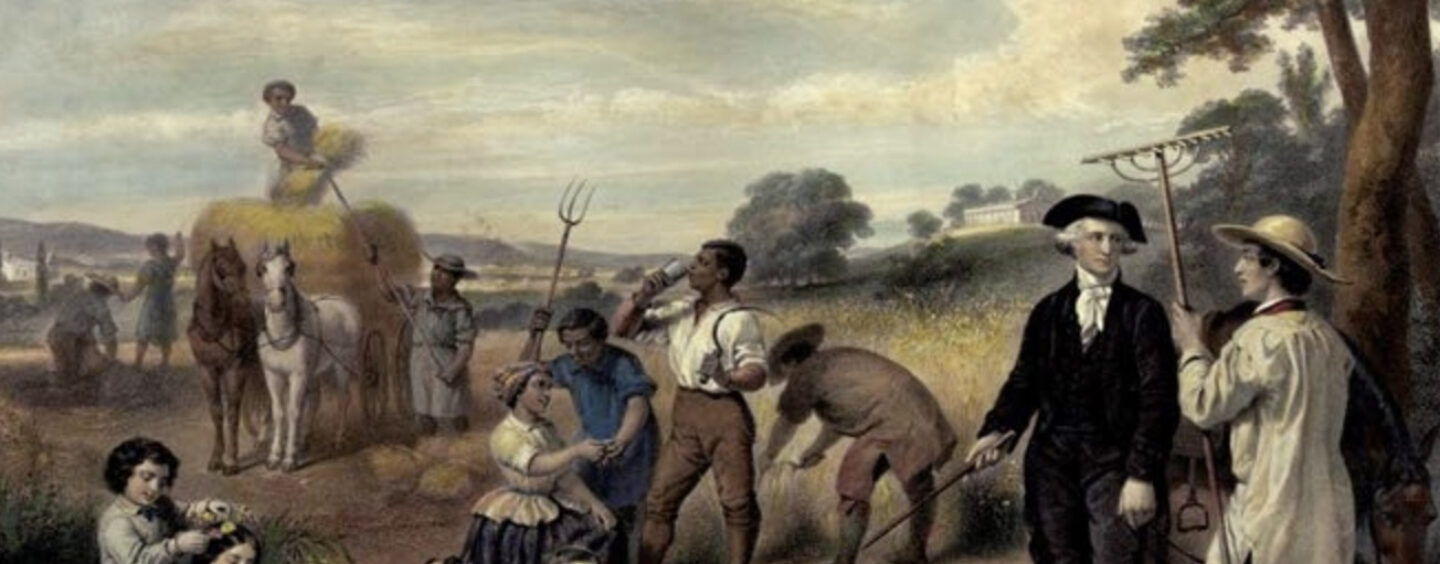BOOK REVIEW: Washington at the Plow: The Founding Father and the Question of Slavery
by Bruce A. Ragsdale (Belknap Press of Harvard University Press, 2021)
In Washington at the Plow: The Founding Father and the Question of Slavery, Bruce Ragsdale provides an in-depth examination of George Washington’s passion for agriculture and the way it changed his views of slavery. Washington is remembered for his military service as well as being the nation’s first President, but he spent far more years in the pursuit of farming excellence. Although previous works have portrayed Washington’s desire to retire from public life and return to Mount Vernon, Ragsdale demonstrates that this desire was more than just filling the bill of the expected trope of the public servant in Washington’s day. As the book shows, Washington truly wanted to spend his time farming; he put his best efforts into the study of agriculture, and passionately advocated improved agricultural practices as essential for the new nation to thrive at home as well as have successful relations with foreign countries. Along the way, Washington’s views of slavery evolved in relation to his quest to perfect agriculture.
Examining Washington’s relationship to slavery through the lens of his farm improvement projects both underscores the primary importance Washington placed on effective and modern farming practices and provides insight into his evolution of thought regarding the institution. Although it is commonly mentioned that Washington’s will liberated his slaves upon his wife’s death—although Martha ended up freeing them beforehand—prior to this book there has not been a comprehensive study of the path that led Washington to that point. When looking at the stark facts of Washington as slave owner, it is quite the change to go from actively purchasing slaves in 1775 to freeing them in his will in 1799. As Ragsdale’s in-depth research into Washington’s agricultural endeavors shows, the efforts to reform slavery to fit in with modern agriculture practices informed Washington’s evolving views on the institution.
The book proceeds chronologically and traces Washington’s involvement in slavery from the eve of the Revolution to his death. Washington supported the institution during the Revolution through his opposition to arming enslaved people on two counts. First, he feared creating an arms race between the colonists and Britain. Second, Washington balked at arming enslaved people because he thought that granting freedom to them for armed service would make those still enslaved increasingly unhappy with their situation (page 91). At the end of the Revolution, Washington also attempted to have enslaved people returned to their enslavers according to provisional terms in the Treaty of Paris, although he ultimately conceded (p. 93).
Following the Revolution, Washington occupied a unique position as simultaneously the father of liberty and an owner of enslaved people. Abolitionists targeted Washington for support, but at the same time Washington increasingly relied upon enslaved labor to implement his new farming practices. Relying particularly on the British methods called New Husbandry, Washington kept extremely detailed notes of his farming practices and experiments as well as compilations of farming practices he learned from British farming manuals. Through consulting the extensive diaries, notes, and files that Washington kept, Ragsdale reveals the ways in which Washington was unique not only in his dual status of liberator and enslaver, but also unique in the way he used slavery to implement modern farming practices—something that set him apart both from the British practitioners that he so admired as well as from the growing antislavery movement that looked to Washington for inspiration (p. 140).
Washington’s implementation of improved agricultural practices initially relied more heavily on enslaved labor. In effort to adapt slavery to the methods of New Husbandry, Washington created a close system of supervision that viewed field workers and artisans as essential to its success. To this end, Washington’s reforms at this point dealt mostly with seeking to improve the lives of the enslaved, which he did in a variety of ways, including the cessation of participation in the slave trade, the preservation of marriages and families of enslaved people, the provision of adequate care, and the restriction of violent punishment. However, Washington sometimes bent his own rules if it suited his needs. Although he imposed upon himself the rule of no slave trading, he occasionally would purchase an enslaved person if that person brought skills he needed to his farm system (p. 143-145).
Although Washington privately expressed reservations and a desire for emancipation, he made no public statement to that effect. Washington’s view of slavery is further nuanced by the position he shared with many Virginians at his time; even if he had reservations about slavery, he supported the property rights of others. As Washington evolved slavery to adapt to his new methods of farming, he found that the move away from tobacco—the crop that had initially created the demand for slave labor—towards grains made the use of enslaved labor increasingly unprofitable. Washington did find ways to adapt his use of enslaved people and foreshadowed the ways in which slavery would be perpetuated until the eve of the Civil War (p. 289). However, rather than keep his enslaved people in bondage through transfer upon his death, Washington decided to free them. The abolitionists that had appealed to Washington as the figure of liberty praised his actions but felt disappointment as it failed to inspire similar actions in other slaveholders. Furthermore, Gabriel’s Rebellion the following year led to the restriction of manumission (p. 287).
Washington at the Plow is a worthwhile read that expands upon the views and motivations of the man by letting his own extensive system of note-keeping speak for itself. Ragsdale provides a unique look at the specific ways that Washington’s views on slavery evolved throughout his life and provides a particularly unique look at the relationship between agricultural practices and this evolution in thought. While the book sometimes delves deeply into agricultural details that might bog down readers who are not interested in or familiar with agriculture, the book nonetheless is a worthy addition to the study of George Washington.
PURCHASE THIS BOOK FROM AMAZON IN HARDCOVER OR KINDLE
(As an Amazon Associate, JAR earns from qualifying purchases. This helps toward providing our content free of charge.)



